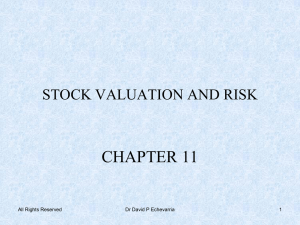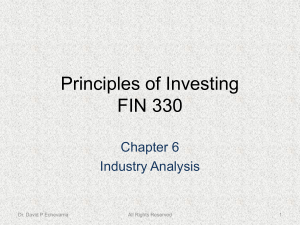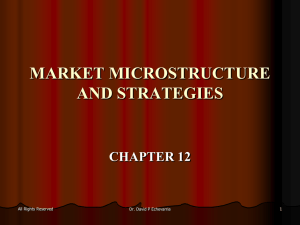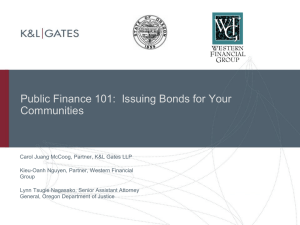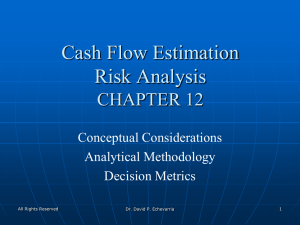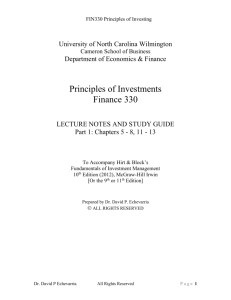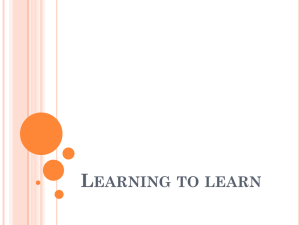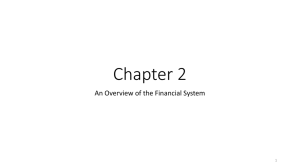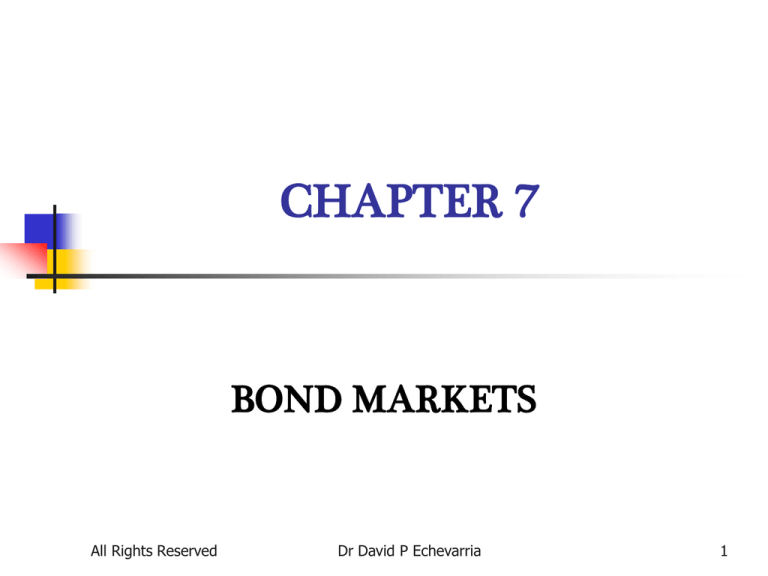
CHAPTER 7
BOND MARKETS
All Rights Reserved
Dr David P Echevarria
1
CAPITAL MARKET
INSTRUMENTS
A. Treasury Bonds
1.
2.
3.
4.
5.
6.
7.
Fed is a large buyer of T-Bonds
Tool for implementing monetary policy
Dealer-dominated secondary market
Semi-annual coupons are typical
Main asset of the FED
Strips (IO or PO): Interest streams repackaged as
separate security (TIGR)
TIPS (1996) inflation-indexed maturity values
All Rights Reserved
Dr David P Echevarria
2
Federal Reserve Balance Sheet
9/5/2013
All Rights Reserved
Dr David P Echevarria
3
CAPITAL MARKET
INSTRUMENTS
B. Municipal Bonds
1. Issued by states, counties, cities and state
agencies
2. Interest is exempt from Federal taxation
3. Some types, i.e. industrial development
bonds, may be completely tax-exempt
4. Tax-preference results in lower offered
yields (rationale for computing before-tax
equivalent yields)
All Rights Reserved
Dr David P Echevarria
4
CAPITAL MARKET
INSTRUMENTS
C. Corporate Bonds
1.
2.
3.
Terms spelled out in the Indenture Agreement;
face value, maturity, coupon, form of collateral if
any, Callable, Sinking Fund required
Insurance Cos are principal buyers of corporate
bonds w/ households second Sold through public
offerings; About half are privately-placed
Proceeds may be used to fund expansion, finance
acquisitions or LBO or to refund maturing bond
issues or to refund higher interest rate debt
All Rights Reserved
Dr David P Echevarria
5
CAPITAL MARKET
INSTRUMENTS
4.
Zero-Coupon bonds pay no coupons; sold at PV
of maturity value; result is very much like a Tbill except the maturity can be up to 30 years
a.
5.
6.
A favorite vehicle for in substance defeasance of debt
for corps seeking to restructure their balance sheets,
High risk uncollateralized bonds are frequently
called "junk bonds"
The US Tax Code favors debt financing; interest
paid with pre-tax dollars
All Rights Reserved
Dr David P Echevarria
6
EVALUATING BOND RISK
A. Interest Rate Risk
1.
2.
Change in price of seasoned bonds as rates change over time
Sensitivity a function of coupon and term to maturity
B. Reinvestment Rate Risk
1.
2.
Valuation formulas assume future cash flows reinvested at
the expected rate of return
If rates drop, future cash flows are invested at lower rates,
reducing the future value of reinvested cash flows
All Rights Reserved
Dr David P Echevarria
7
EVALUATING BOND RISK
C. Default (or business) Risk
1.
2.
Risk that payments may not be made
Importance of indenture agreement
D. Maturity Risk
1.
The longer the maturity, the greater the risk
E. Liquidity Risk
1.
The inability or difficulty in selling for cash
All Rights Reserved
Dr David P Echevarria
8
EVALUATING BOND RISK
F. Companies' debt issues are rated for
riskiness
1.
2.
3.
4.
Standard & Poor's, Moody's, Fitch's
Ratings: AAA to D (S&P scheme)
Ratings are important for many reasons; cost to
borrow, legal list requirements High Quality
(AAA - AA), Investment Grade (AAA - BBB),
Speculative (BB and B), Highly speculative (C's),
Default (D's)
Public Utilities are the single largest issuer of
bonds
All Rights Reserved
Dr David P Echevarria
9
FINANCIAL INSTITUTIONS
IN BOND MARKETS
A. Insurance Companies are largest
buyer of Bonds
B. Attractiveness of bonds are their
known payouts over time
C. Bonds offer frequent opportunities for
capital gain strategies with relatively
low risk
All Rights Reserved
Dr David P Echevarria
10
GLOBALIZATION OF BOND
MARKETS
A. Impact of Exchange Rates on Foreign Bond
Returns
1.
Dealing with the double problems of InterestRate and Currency Parity
a.
b.
2.
3.
Use of interest rate swaps in international bond
markets
Use of currency swaps in international bond markets
Economic growth rate differentials as well as
government policy
Always a good idea to diversify international
bond portfolios
All Rights Reserved
Dr David P Echevarria
11
HOMEWORK QUESTIONS
A.
B.
C.
D.
E.
F.
G.
H.
How is buying and selling accomplished in the T-Bond
market?
How does the Fed use its inventory of treasury securities?
Who issues municipals? What is their principal attraction to
an investor?
What type of investor should be most interested in
municipals?
What are zero-coupon bonds? Why might borrowers prefer
them?
What are the main sources of risk in a bond investment?
What are the two sources of risk when investing in foreign
bonds?
How might we minimize the risk addressed in the previous
question?
All Rights Reserved
Dr David P Echevarria
12


